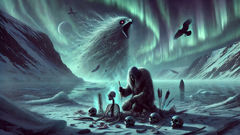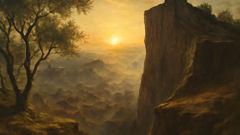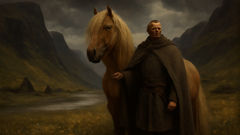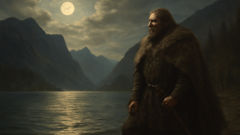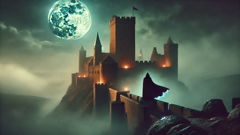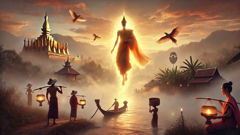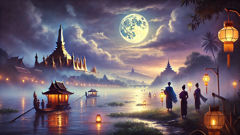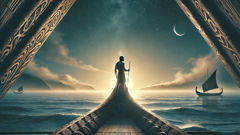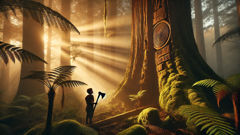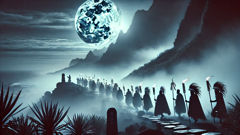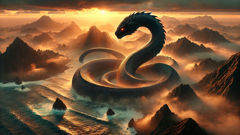Introduction
In the shadowed expanse of Greenland’s ancient ice, where the land breathes with secrets older than memory and the sky flickers with veils of green and violet light, stories pass from breath to breath, warming the soul through endless polar nights. Among these stories, none chills the bones quite like the legend of the Tupilaq—a creature birthed not from nature, but from the forbidden hands of those who dared to shape vengeance from bone and darkness. The people of the coast, hardy Inuit families who built their lives amid howling winds and grinding glaciers, understood the fragile pact that held their world together: respect the spirits, walk lightly on the land, and never disturb what should remain at rest. But in every generation, pain and injustice can drive even the wisest to desperate acts. This is the tale of Ujarak, a shaman whose life was upended by sorrow and betrayal, whose heart ached for justice that the world refused him. When his only son vanished beneath the black sea ice, and whispers of murder swirled through the village, Ujarak’s grief curdled into obsession. He turned to secrets whispered only at the edge of firelight, to rituals the elders warned could unleash far more than revenge. What followed would etch a scar across his people’s memory: the coming of the Tupilaq—a monstrous avenger fashioned from animal bones, sinew, and the lingering breath of old spirits, set loose to hunt and destroy an enemy. Yet the price of such forbidden power would ripple far beyond a single feud, threatening the delicate balance between humans and the unseen world. In the swirling snow and echoing silence, Ujarak’s journey would test the boundaries of grief, the true cost of retribution, and the ancient wisdom that endures in Greenland’s icy heart.
The Shaman’s Grief and the Seeds of Vengeance
Ujarak was known throughout the coastal villages as a man of wisdom. His voice, as rough and deep as glacial stones, carried comfort in times of loss and guidance when the ice cracked beneath a hunter’s foot. He’d learned the ancient ways from his grandmother, the last shamaness before him, inheriting not just her sealskin drum but her gift for walking the borderlands between the living and spirit realms. For decades, he used his knowledge to heal, to interpret omens, and to keep peace among neighbors whose survival depended on unity. But nothing in Ujarak’s learning prepared him for the loss of his only son, Aputsiaq.
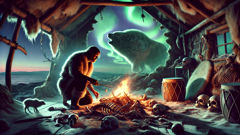
The winter had been harsher than any could remember. Blizzards battered the coast, starving the sea of seals and leaving the hunters empty-handed. On the night Aputsiaq disappeared, a storm howled so fiercely that the old sod houses shook, and snowdrifts crept in through every crack. By morning, he was gone—a trail of broken ice led out onto the fjord, and nothing more. At first, the village believed he had fallen victim to the hungry sea. But Ujarak’s dreams told him otherwise. He saw flashes: hands pushing, a struggle in the dim blue light under the ice, and a face twisted with hate. He awoke each morning with grief knotted in his chest, and suspicion gnawing at his soul.
Aputsiaq had been no stranger to rivalry. The younger men, restless with hunger and fear, had quarreled over hunting grounds and a coming-of-age bride. One in particular, Ikumaq, bore a deep grudge—he’d been bested by Aputsiaq in both skill and love. Ujarak watched Ikumaq, saw the way he avoided his gaze, how he boasted louder than before, how his hunting luck seemed to change overnight. No proof, only the cold certainty in his bones.
Ujarak turned to the elders. He pleaded for justice, demanded that Ikumaq answer for his son’s death. But there was no evidence—only a missing boy and a shattered father. The elders counseled patience; the spirits would reveal the truth in time. But time, to Ujarak, became an enemy. He grew hollow-eyed, haunted. At night, he pounded his drum with raw hands, calling out to Aputsiaq’s soul, seeking signs in the aurora. He began to neglect his duties as shaman, his grief turning to bitterness as he watched Ikumaq prosper.
The elders grew wary. Whispers stirred that Ujarak had lost his path. Children avoided his hut, where sealskin curtains fluttered and strange odors wafted on the wind. Then, in the depth of polar night, Ujarak made a choice that would haunt generations: he would summon the Tupilaq, the ancient avenger forbidden by their ancestors. He’d heard the stories, passed in fearful tones—the Tupilaq could be fashioned from animal bones, sinew, driftwood, even fragments of the dead. A shaman would infuse it with a soul—sometimes even their own—naming an enemy for it to hunt. But such power never came without a price. The Tupilaq, once unleashed, could not be called back; its rage might turn on its creator or even the innocent. Still, Ujarak’s pain drowned out caution. In his mind, only the Tupilaq could bring justice where men refused.
He set about gathering what he needed in secret. At the tide line, he collected bones polished smooth by sea and time—polar bear jaws, seal vertebrae, bird skulls. From his hut he took sinew, feathers, and a lock of Aputsiaq’s hair. At night, he wove the pieces together, binding them with whispered curses and old words. The form was monstrous: jaws that gaped with too many teeth, arms both flipper and claw, empty sockets where eyes should glow. On the coldest night, beneath the swirling aurora, Ujarak bared his wrists and let his blood drip onto the creation. He chanted, voice rising to a shriek, offering up his rage, his sorrow, his son’s name.
The bones rattled. The sinew twitched. The Tupilaq opened its maw and drew its first breath.
The Tupilaq Unleashed
No sound broke the silence as the Tupilaq left Ujarak’s hut, save for the shuddering crunch of snow under its uneven limbs. It moved with unnatural stealth, melting into darkness, following a trail only vengeance could scent. The village dogs woke first—howling, backs bristling with fear as something unseen passed their snow-packed chains. Ujarak watched from his doorway, torn between terror and grim satisfaction. He’d set a force loose upon the world that no man could command.
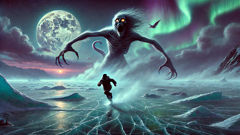
Ikumaq was out on the ice that night, setting his lines under a pale moon. He’d grown bolder since Aputsiaq’s disappearance, swaggering with new furs and a sharp spear. But as the wind shifted, he felt the weight of eyes on his back—cold and ancient, far older than any man. When he turned, there was nothing but darkness beyond his flickering oil lamp. But the dogs refused to follow him onto the ice, and his every footstep echoed louder than it should. Then came the sound: a low, scraping moan, part animal and part human anguish.
The first attack left no marks. Ikumaq staggered home at dawn, shivering and wild-eyed, muttering about shadows that crawled beneath the ice and whispers from the deep. The elders dismissed it as guilt or madness, but Ujarak knew better. Each night, the Tupilaq returned—growing bolder, more real. It appeared as a monstrous shape just out of reach: antlers sprouting from a jawless skull, feathers smeared with blood, eyes like glowing embers. It taunted Ikumaq, driving him further from safety, luring him out to the crumbling edge of the sea.
But vengeance is a crooked path. The Tupilaq did not stop at Ikumaq. Villagers who had shunned Ujarak, who’d spoken ill of his grief or turned away from his pleas, found themselves plagued by nightmares. Fish spoiled in nets overnight. The dogs refused food, whining at things unseen. Children woke screaming of bones that danced and sang beneath their beds. Fear spread faster than winter wind. The elders gathered in the great house, debating what curse had been unleashed. Some blamed Ujarak, others suspected a rival village had sent evil spirits. But Ujarak kept silent, haunted by visions of the Tupilaq slithering through the snow, bearing his own sorrow like a beacon.
One night, Ikumaq vanished. His tracks led out onto the broken sea ice—just as Aputsiaq’s had. The only sign of struggle was a twisted length of sinew and a single raven feather, blackened as if by fire. The village mourned, but unease lingered. The elders called for cleansing rituals, burning seal oil and chanting for the spirits’ forgiveness. Yet nothing could banish the sense that a boundary had been crossed—a darkness awakened that would not be easily laid to rest.
Ujarak became more withdrawn, tormented by what he’d unleashed. Each night, he dreamt of the Tupilaq—now grown monstrous beyond recognition, its hunger unending, its rage turning in widening circles. He feared it would return for him next, that his own soul would be devoured by what he’d created. Seeking answers, he journeyed inland to find his grandmother’s spirit, hoping to undo what he’d begun.
Redemption and the Price of Power
Haunted by nightmares and whispers from both living and dead, Ujarak trekked across wind-blasted ridges and frozen rivers into the ancient valleys where shamans once spoke with the world’s first spirits. The journey was perilous—he nearly perished in a blizzard and fended off a starving polar bear with only his drum and voice. He ate what little dried fish he carried and sang the old songs to keep his courage alive.
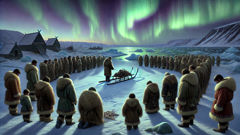
At last, he reached a sacred cave where ancestors’ bones rested in silence, their stories etched into the stone by generations of shamanic hands. There, by the flickering light of a tallow lamp, he called out for his grandmother’s spirit. The air thickened. The shadows stretched long. A figure emerged from the darkness: his grandmother, draped in ancient furs, her eyes glowing like coals beneath a drift of white hair.
“Why have you come?” she asked, her voice both loving and stern.
Ujarak wept. He confessed what he’d done—how he’d fashioned the Tupilaq, named Ikumaq as its prey, and let vengeance twist his heart. He begged for a way to call back the creature and restore balance to the world. His grandmother listened in silence, then knelt beside him, touching his brow with cold fingers.
“You have broken the oldest law: to let grief become hatred is to poison not just your enemy, but yourself and your people,” she said. “The Tupilaq carries your pain; it will not rest until you make peace with your loss and return what you have taken.”
“But how?” Ujarak pleaded. “The dead do not return. My son is lost.”
“Yet your village remains,” she replied. “Your duty is to heal—not just yourself, but those you have harmed by unleashing the Tupilaq. Only then may the spirits forgive you.”
Armed with this wisdom, Ujarak journeyed home. The trek back was even harder—each step a fight against wind and memory. When he finally arrived, he found the village in chaos: food spoiled faster than it could be caught, the dogs wasted away, and people huddled in fear at every shadow. The elders confronted him, demanding to know what evil he’d unleashed. This time, Ujarak did not deny it. He confessed before all: he had created the Tupilaq out of grief and rage; he had named Ikumaq as its target; and now the whole village suffered for his arrogance.
The elders judged him harshly but recognized his courage in speaking truth. They called for a great ceremony—to cleanse not just Ujarak but all who had been touched by anger and suspicion. Together, they gathered on the shore at twilight. Ujarak brought out what remained of the Tupilaq—a twisted mass of bone and sinew now brittle as frost. He placed it upon a sled made from driftwood and sealskin and, with all the villagers watching, pushed it out onto an ice floe as the aurora shimmered overhead.
Chanting ancient songs, the villagers asked forgiveness from the spirits of sea and sky. As the sled drifted out to sea and the tide carried it beyond sight, a strange calm fell upon the land. The dogs stopped howling. The fish returned to the nets. Children slept through the night once more. Ujarak felt his heart lighten, though grief still lingered like a shadow at dusk.
In time, Ujarak returned to his place as shaman—but changed. He warned all who would listen that anger is a double-edged blade, that vengeance always cuts deeper than intended. And so the legend of the Tupilaq lived on: a tale whispered by firelight, a reminder that the line between justice and destruction is thin as river ice in spring.
Conclusion
In Greenland’s icy heartland, where every breath is borrowed from the spirits and every story a warning or blessing, the legend of the Tupilaq remains—a living memory woven through generations. Ujarak’s tale is retold not to glorify vengeance but to teach respect for the unseen bonds that hold community and spirit together. The Tupilaq is not just a monster to frighten children; it is a mirror of human pain and the dangers of letting sorrow become wrath. Through suffering and redemption, Ujarak learned that true justice cannot be summoned by force or magic—it is found in forgiveness, humility, and the hard work of healing old wounds. So, when the northern lights ripple above silent villages and the wind stirs stories from snowdrifts, the people remember: balance with nature and one another is sacred. For those who trespass against that balance, even with good intent, risk awakening forces they can’t control. Yet hope endures. In every telling of the Tupilaq’s legend, there is a lesson: that reconciliation is stronger than revenge, and that even in the deepest cold, compassion can kindle a light that guides the lost safely home.

